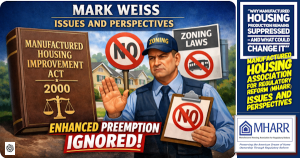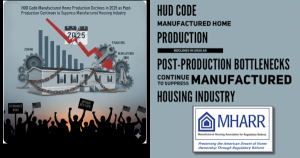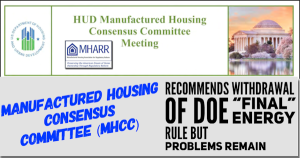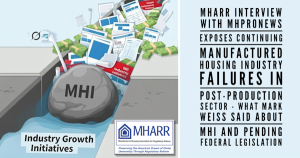MHARR Urges New Ginnie Mae President to Restore Support for – and Integrity of – Manufactured Home Consumer Lending
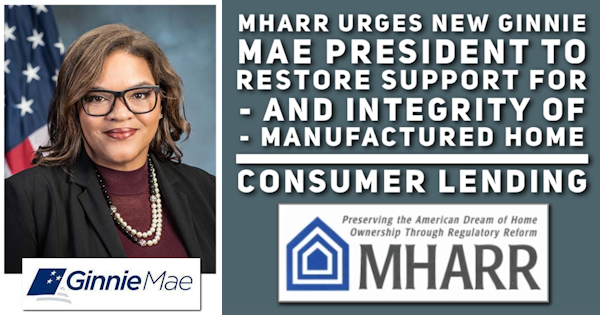
MHARR, in a January 10, 2022 communication to new Government National Mortgage Association (Ginnie Mae) President, Alanna McCargo copy attached, has called on that organization to fully restore its statutory support for manufactured home consumer lending and thus re-establish the integrity and full-scale utilization of this government-insured home lending program.
As industry members are aware, the Federal Housing Administration’s (FHA) Title I manufactured housing personal property loan program, providing federally-insured purchase-money loans on HUD Code manufactured homes, ultimately securitized and guaranteed through Ginnie Mae, was once a significant source of consumer financing within the manufactured housing market, providing ten-of-thousands of loans annually.
That level support for the manufactured housing finance market, however, came to an abrupt halt when Ginnie Mae, in the wake of the 2008-2009 home mortgage crisis and weak industry post-production sector representation in Washington, D.C., adopted its infamous “10-10” rule, which effectively excludes the vast majority of manufactured home financing providers from qualifying for participation in the FHA Title I program. Instead, participation in the Title I program during the needlessly-prolonged “10-10” era, has essentially been limited to two lenders affiliated with Clayton Homes and its corporate parent, Berkshire Hathaway, Inc., neither of which have prioritized FHA-based lending. This, in turn, has resulted in a sharp and continuing decline in FHA Title I originations, which have fallen to negligible levels since the imposition of the “10-10” dictate in 2010.
This “destruction by regulation” of the statutory FHA Title I manufactured housing program not only stands in violation of Congress’ recently-reiterated support for an active and meaningful FHA/Ginnie Mae Title I lending effort, but also undermines racial equity in home lending, contrary to the most fundamental policies of the Biden Administration, by effectively closing-off a non-discriminatory source of government-sponsored financing for minority homebuyers (and particularly lower and moderate-income families) who face disproportionately-high loan rejection rates within the private-sector home financing market as reported in 2021 by the Consumer Finance Protection Bureau (CFPB).
This de facto administrative elimination of the FHA Title I manufactured housing program, combined with the de facto administrative elimination of the statutory Duty to Serve (DTS) mandate with respect to manufactured housing personal property loans — as MHARR has repeatedly warned the industry, Congress and the Biden administration — has effectively put HUD Code consumers and the industry “between a rock and a hard place,” with absolutely no securitization or secondary market support for the nearly 80 percent of the manufactured home consumer financing market represented by chattel loans, through either federally insured and securitized Title I loans, or private sector loans pursuant to DTS. The historical absence of effective national-level representation for retailers, communities and financing companies, therefore, to fight-back against such destructive policies, has – and continues to – deprive consumers of the benefits of full access to affordable manufactured housing, together with a fully-competitive financing market.
MHARR, will continue to educate and press Congress and the Biden Administration to fully restore and implement these two good laws – FHA Title I manufactured home lending support and DTS — that have been squandered in Washington, D.C. for far too long.
cc: HUD Code Manufactured Housing Producers, Retailers, Communities and Finance Companies
Manufactured Housing Association for Regulatory Reform (MHARR)
1331 Pennsylvania Ave N.W., Suite 512
Washington D.C. 20004
Phone: 202/783-4087
Fax: 202/783-4075
Email: MHARR@MHARRPUBLICATIONS.COM
Website: manufacturedhousingassociation.org

MHARR, in a January 10, 2022 communication to new Government National Mortgage Association (Ginnie Mae) President, Alanna McCargo copy attached, has called on that organization to fully restore its statutory support for manufactured home consumer lending and thus re-establish the integrity and full-scale utilization of this government-insured home lending program.
As industry members are aware, the Federal Housing Administration’s (FHA) Title I manufactured housing personal property loan program, providing federally-insured purchase-money loans on HUD Code manufactured homes, ultimately securitized and guaranteed through Ginnie Mae, was once a significant source of consumer financing within the manufactured housing market, providing ten-of-thousands of loans annually.
That level support for the manufactured housing finance market, however, came to an abrupt halt when Ginnie Mae, in the wake of the 2008-2009 home mortgage crisis and weak industry post-production sector representation in Washington, D.C., adopted its infamous “10-10” rule, which effectively excludes the vast majority of manufactured home financing providers from qualifying for participation in the FHA Title I program. Instead, participation in the Title I program during the needlessly-prolonged “10-10” era, has essentially been limited to two lenders affiliated with Clayton Homes and its corporate parent, Berkshire Hathaway, Inc., neither of which have prioritized FHA-based lending. This, in turn, has resulted in a sharp and continuing decline in FHA Title I originations, which have fallen to negligible levels since the imposition of the “10-10” dictate in 2010.
This “destruction by regulation” of the statutory FHA Title I manufactured housing program not only stands in violation of Congress’ recently-reiterated support for an active and meaningful FHA/Ginnie Mae Title I lending effort, but also undermines racial equity in home lending, contrary to the most fundamental policies of the Biden Administration, by effectively closing-off a non-discriminatory source of government-sponsored financing for minority homebuyers (and particularly lower and moderate-income families) who face disproportionately-high loan rejection rates within the private-sector home financing market as reported in 2021 by the Consumer Finance Protection Bureau (CFPB).
This de facto administrative elimination of the FHA Title I manufactured housing program, combined with the de facto administrative elimination of the statutory Duty to Serve (DTS) mandate with respect to manufactured housing personal property loans — as MHARR has repeatedly warned the industry, Congress and the Biden administration — has effectively put HUD Code consumers and the industry “between a rock and a hard place,” with absolutely no securitization or secondary market support for the nearly 80 percent of the manufactured home consumer financing market represented by chattel loans, through either federally insured and securitized Title I loans, or private sector loans pursuant to DTS. The historical absence of effective national-level representation for retailers, communities and financing companies, therefore, to fight-back against such destructive policies, has – and continues to – deprive consumers of the benefits of full access to affordable manufactured housing, together with a fully-competitive financing market.
MHARR, will continue to educate and press Congress and the Biden Administration to fully restore and implement these two good laws – FHA Title I manufactured home lending support and DTS — that have been squandered in Washington, D.C. for far too long.
cc: HUD Code Manufactured Housing Producers, Retailers, Communities and Finance Companies
Manufactured Housing Association for Regulatory Reform (MHARR)
1331 Pennsylvania Ave N.W., Suite 512
Washington D.C. 20004
Phone: 202/783-4087
Fax: 202/783-4075
Email: MHARR@MHARRPUBLICATIONS.COM
Website: manufacturedhousingassociation.org


